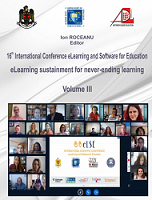SHAPING THE FUTURE: BETWEEN OPPORTUNITIES AND CHALLENGES OF THE ONGOING 4th AND THE FORTHCOMING 5th INDUSTRIAL REVOLUTION
SHAPING THE FUTURE: BETWEEN OPPORTUNITIES AND CHALLENGES OF THE ONGOING 4th AND THE FORTHCOMING 5th INDUSTRIAL REVOLUTION
Author(s): Ioana Petcu, Dragoş Cătalin Barbu, Monica Anghel, Andreea Florina Radu, Daniela Georgiana GoleaSubject(s): Business Economy / Management, Civil Society, Public Administration, Labor relations, State/Government and Education, ICT Information and Communications Technologies
Published by: Carol I National Defence University Publishing House
Keywords: Digitalization; Artificial Intelligence; Industrial Revolution; Sustainability; Technological Evolution;
Summary/Abstract: The impact of the recent digital and innovative technological evolutions has, by all means, been major on every aspect of our lives, affecting and transforming our societies. We are living an era of fast technological developments. Thus, we dare stating that the natural selection is not an option anymore, but rather the forced evolution and only those looking for new creative, innovative solutions will be able to survive, evolve and thrive in the future. We recently entered the 4th industrial revolution and we are about to take the next step to the 5th one. But we have to question ourselves: are we truly ready to keep up with this alert pace of evolution? Are we prepared and aware of the opportunities and most important of the challenges brought by the new technological revolutions? Therefore, our paper aims to analyse / evaluate in a more or less comprehensive approach, the current state of play of the digital and innovative solutions (e.g.: artificial intelligence) and their future impact on public administration's and business environment activities, educational systems and on the society, as a whole. Through our paper we also want to underline that we do not have any guarantees on how the scenarios will unfold, but nevertheless, we do have the prerequisites to foresee those scenarios and prepare ourselves to respond in a common, integrated manner, informing and involving all stakeholders - the public and private sector, academia and civil society. Only taking this path we can make the most out of it and generate added value, in terms of: more efficient and up-to-date public services, increased quality of products and services provided by companies, a functional and sustainable labour market, implicit overall competitiveness and not at last, a better quality of life for citizens.
Journal: Conference proceedings of »eLearning and Software for Education« (eLSE)
- Issue Year: 16/2020
- Issue No: 03
- Page Range: 91-97
- Page Count: 7
- Language: English

